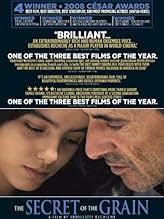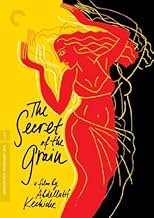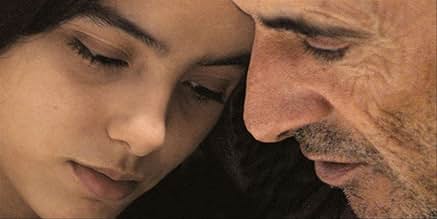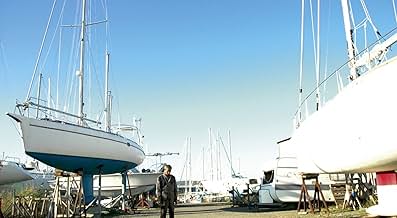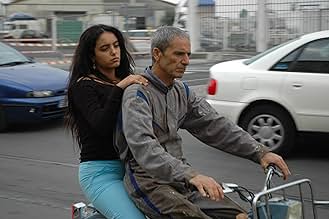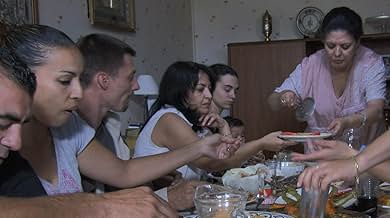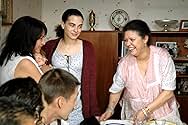La graine et le mulet
- 2007
- Tous publics
- 2h 31min
NOTE IMDb
7,4/10
8,1 k
MA NOTE
Dans le sud de la France, un ouvrier de chantier naval d'origine arabe poursuit son rêve d'ouvrir un restaurant en compagnie de la fille de sa conjointe.Dans le sud de la France, un ouvrier de chantier naval d'origine arabe poursuit son rêve d'ouvrir un restaurant en compagnie de la fille de sa conjointe.Dans le sud de la France, un ouvrier de chantier naval d'origine arabe poursuit son rêve d'ouvrir un restaurant en compagnie de la fille de sa conjointe.
- Réalisation
- Scénario
- Casting principal
- Récompenses
- 19 victoires et 9 nominations au total
Nadia Taoul
- Sarah
- (as Nadia Taouil)
Avis à la une
10jean-no
Abdellatif Kechiche did very well with his previous movie "L'Esquive". But here we have even better. The story is simple : I'd say it is mostly about dignity, sacrifice and family love. The acting is brilliant. Habib Boufares is perfect, the young Hafsia Herzi is astounding, especially for the end of the movie. The actors are mostly non-professional people but the script is very well written and the characters are well defined, so this "amateurism" does great and helps the audience's immersion. The cinematography is very special (but never disturbing), with a lot of very close close-ups. The camera is "natural" as with Casavettes, but not "drunk", it is not a pain to watch and you don't get sea sick. The whole movie reminded me the Italian neo-realism and also a little of Renoir. Some people mention Pialat. It's a quite long movie but you don't feel it while watching, you just realize it after.
Diane and I attended this wonderful film in Fremantle this morning and both of us left the theater at its conclusion realising that we had seen an unusual film from an unusual ethnic angle and that the director and actors had completed a superb work.
I adore our Australian films because many of them explore the mundane drama of quiet ordinary life and this film is no exception even though it is French rather than Australian. I guess Hollywood does not believe viewers are sensitive enough to pay to see domestic drama and that the subject matter must always be "bigger than Ben Hurr" but our movies as well as many European movies have proved that the examination of quiet aspects of everyday life can provide extremely compelling material for contemporary films.
IMDb commentators found it off-putting to watch long film sequences about potty training, marital squabbles and restaurant scenes; however, this is the stuff of myriad similar domestic situations that we are all familiar with. The genius being that the director can make these scenes rich enough to watch. Diane and I both believe he did this admirably as well as providing much to discuss and reflect upon later.
We both found it different and endearing that we were allowed into the lives of people and their situations that would be closed to us without this delightful film. Yes, I used the adjective "delightful"; the scenes of domesticity were enlightening and compellingly endearing because we are inundated with Western examples of the genre but few (such as in this film) of other ethnic examples.
A film that should not be missed!
I adore our Australian films because many of them explore the mundane drama of quiet ordinary life and this film is no exception even though it is French rather than Australian. I guess Hollywood does not believe viewers are sensitive enough to pay to see domestic drama and that the subject matter must always be "bigger than Ben Hurr" but our movies as well as many European movies have proved that the examination of quiet aspects of everyday life can provide extremely compelling material for contemporary films.
IMDb commentators found it off-putting to watch long film sequences about potty training, marital squabbles and restaurant scenes; however, this is the stuff of myriad similar domestic situations that we are all familiar with. The genius being that the director can make these scenes rich enough to watch. Diane and I both believe he did this admirably as well as providing much to discuss and reflect upon later.
We both found it different and endearing that we were allowed into the lives of people and their situations that would be closed to us without this delightful film. Yes, I used the adjective "delightful"; the scenes of domesticity were enlightening and compellingly endearing because we are inundated with Western examples of the genre but few (such as in this film) of other ethnic examples.
A film that should not be missed!
Tunisian born French director Abdellatif Kechiche's third feature Secret of the Grain is dedicated to his father whose silence after a long day of hard work reflects the demeanor of the film's lead protagonist, Slimane Beiji (Habib Boufares), a Tunisian immigrant who has been laid off from his job in the shipyards after thirty five years. Winner of best picture, director, screen play and actress awards at the 2008 Cesar Awards, the film is not a Loach-type work of social consciousness but a rich, varied, multi-layered family drama that is universal in its appeal. Although the English title of the film suggests there is some secret held by the grain, the only secret in Secret of the Grain is how Kechiche manages to seamlessly weld together into a cohesive whole such disparate elements as the traditions of great cooking, the problems immigrants confront when dealing with white authority, and the desire to leave a legacy to your children.
Set in the French coastal village of Séte on the Mediterranean, the grain in the title refers to couscous, a diet staple of Tunisian immigrants and a dish that Slimane hopes to use to turn a dilapidated old boat into a profitable restaurant with his ex-wife Souad (Bouraouia Marzouk) doing the cooking. Shot with a hand-held camera that bobs and weaves through long takes of eating, animated dinner conversations, and emotional family disputes, the 151-minute Secret of the Grain has the authenticity you would expect if you accidentally stumbled into a Greek restaurant where an animated family dinner was taking place. In a scene at one of the two family dinners that take up half of the film, the length and variety of facial close-ups of people chewing, laughing, and talking in multi-cultural accents is staggering.
The centerpiece of the film is Slimane and his clan consisting of his two sons, five daughters, grandchildren, his ex-wife Souad, his lover Latifa (Hatika Karaoui), and her fiery twenty-year-old daughter Rym (Hafsia Herzi) who adores Slimane and whose energy and business acumen is the catalyst for his risky venture. Slimane, a man of sixty-one whose periods of silence stand in sharp contrast to the loquaciousness of his family, lives in a modest room in a weather-beaten hotel run by Latifa. A generous man, Slimane collects fish from his fisherman friends and delivers them each week to Souad, his older daughter Karima (Faridah Benkhetache); and Latifa.
The first hour delves into mundane family matters. When Slimane visits his eldest daughter Karima (Farida Benkhetache) to deliver some fish, Karima's anger at her three year-old daughter who refuses the potty dominates the conversation which continues for almost ten minutes interspersed with comments about the decline of the shipping industry. Other extended domestic scenes revolve around the escapades of Slimane's irresponsible son Majid (Sami Zitouni) whose extra-marital affairs threaten to drive his Russian wife Julia (Alice Houri) out of the family. The idea of starting a restaurant at age sixty-one raises much skepticism in the community and Slimane's plans are considered too thin and too unsupported by economic reality by the bank he asks for a loan.
To prove the worth of his idea, however, Slimane invites one hundred city officials, potential investors, friends and family to the boat that he, Rym, and his son Riadh (Mohamed Benabdeslem) painstakingly renovated. The opening night turns out to be an astonishing tour de force that combines life-affirming exuberance, sensual music and belly dancing, and an avoidable crisis that leads to heightened family tension and a suspenseful final half hour. Kechiche, a former movie and TV actor, has assembled an outstanding ensemble cast with first rate performances, especially from Boufares and Herzi. Though the film has many discussions about food, it is not a feel-good "food movie" but a complex, deeply intense narrative that elevates one family's personal struggles into a drama of epic scope.
Set in the French coastal village of Séte on the Mediterranean, the grain in the title refers to couscous, a diet staple of Tunisian immigrants and a dish that Slimane hopes to use to turn a dilapidated old boat into a profitable restaurant with his ex-wife Souad (Bouraouia Marzouk) doing the cooking. Shot with a hand-held camera that bobs and weaves through long takes of eating, animated dinner conversations, and emotional family disputes, the 151-minute Secret of the Grain has the authenticity you would expect if you accidentally stumbled into a Greek restaurant where an animated family dinner was taking place. In a scene at one of the two family dinners that take up half of the film, the length and variety of facial close-ups of people chewing, laughing, and talking in multi-cultural accents is staggering.
The centerpiece of the film is Slimane and his clan consisting of his two sons, five daughters, grandchildren, his ex-wife Souad, his lover Latifa (Hatika Karaoui), and her fiery twenty-year-old daughter Rym (Hafsia Herzi) who adores Slimane and whose energy and business acumen is the catalyst for his risky venture. Slimane, a man of sixty-one whose periods of silence stand in sharp contrast to the loquaciousness of his family, lives in a modest room in a weather-beaten hotel run by Latifa. A generous man, Slimane collects fish from his fisherman friends and delivers them each week to Souad, his older daughter Karima (Faridah Benkhetache); and Latifa.
The first hour delves into mundane family matters. When Slimane visits his eldest daughter Karima (Farida Benkhetache) to deliver some fish, Karima's anger at her three year-old daughter who refuses the potty dominates the conversation which continues for almost ten minutes interspersed with comments about the decline of the shipping industry. Other extended domestic scenes revolve around the escapades of Slimane's irresponsible son Majid (Sami Zitouni) whose extra-marital affairs threaten to drive his Russian wife Julia (Alice Houri) out of the family. The idea of starting a restaurant at age sixty-one raises much skepticism in the community and Slimane's plans are considered too thin and too unsupported by economic reality by the bank he asks for a loan.
To prove the worth of his idea, however, Slimane invites one hundred city officials, potential investors, friends and family to the boat that he, Rym, and his son Riadh (Mohamed Benabdeslem) painstakingly renovated. The opening night turns out to be an astonishing tour de force that combines life-affirming exuberance, sensual music and belly dancing, and an avoidable crisis that leads to heightened family tension and a suspenseful final half hour. Kechiche, a former movie and TV actor, has assembled an outstanding ensemble cast with first rate performances, especially from Boufares and Herzi. Though the film has many discussions about food, it is not a feel-good "food movie" but a complex, deeply intense narrative that elevates one family's personal struggles into a drama of epic scope.
I have heard this film being compared to Eat Drink Man Woman, which is fair enough, if not slightly deceptive. Sure, there's a similar veneration for the art of cooking and how this draws and binds families. But the film casts a wider net than this may suggest. For me, it strongly resembles the humanistic and naturalistic stories of Robert Guédiguian, particularly La ville est tranquille (The Town is Quiet).
The actors are largely non-professionals. The use of long takes, including long stretches of dialogue, is very impressive and suggests that some of the script may be improvisational. I liked the chit-chat, the small details of daily life (like toilet-training a child), that films normally gloss over.
The film has a documentary look and feel and parts are like a fly-on-the-wall at a family gathering. For me, the importance of this is to convey how human this family is, with a rich and warm cultural heritage. In particular, it renders as impotent, irrational fears of Muslim culture.
The film works on multiple levels because it taps into the universal everyday concerns that potentially touch us all in one form or another: prejudice against immigrants, attitudes towards Islam post 9-11, globalisation, ageism in the workforce, the effects of poverty, family breakdown and more. Yet, importantly, the film is not preachy but merely presents life in a matter-of-fact way.
The female performances in the film are particularly affecting, especially the young Hafsia Herzi playing Rym, the daughter of Slimane's lover, and Leila D'Issernio who plays his Russian daughter-in-law.
At 148 minutes, the film is quite long, though this is not apparent until the final scene, which seems to be prolonged in real-time for a particular effect. On paper, the story looks like something we've seen before, but avoids all the clichés we might expect. I loved it.
The actors are largely non-professionals. The use of long takes, including long stretches of dialogue, is very impressive and suggests that some of the script may be improvisational. I liked the chit-chat, the small details of daily life (like toilet-training a child), that films normally gloss over.
The film has a documentary look and feel and parts are like a fly-on-the-wall at a family gathering. For me, the importance of this is to convey how human this family is, with a rich and warm cultural heritage. In particular, it renders as impotent, irrational fears of Muslim culture.
The film works on multiple levels because it taps into the universal everyday concerns that potentially touch us all in one form or another: prejudice against immigrants, attitudes towards Islam post 9-11, globalisation, ageism in the workforce, the effects of poverty, family breakdown and more. Yet, importantly, the film is not preachy but merely presents life in a matter-of-fact way.
The female performances in the film are particularly affecting, especially the young Hafsia Herzi playing Rym, the daughter of Slimane's lover, and Leila D'Issernio who plays his Russian daughter-in-law.
At 148 minutes, the film is quite long, though this is not apparent until the final scene, which seems to be prolonged in real-time for a particular effect. On paper, the story looks like something we've seen before, but avoids all the clichés we might expect. I loved it.
Abdel Kechiche's tragicomedy is a film of contradictions and contrasts. It is both quiet and boisterous, with a script that is both understated and energetic, and which explores (among other things) how communities both accept immigrants, and yet remain suspicious of them.
Couscous follows sixty-something Slimane Beiji, a Tunisian-French shipyard worker in the French port town of Sète, played with reserved dignity by Habib Boufares. Despite being divorced, Slimane still spends a lot of time with his ex-wife and their extended family. The rest of his time is spent with his girlfriend and her daughter, who own a quayside hotel.
When Slimane is laid off, it comes as the last straw in a life that has become increasingly redundant. Left with nothing to lose, he hits upon the idea of opening a restaurant on an old boat. The project becomes a focal point for Slimane's extended family: his sons lend a hand with the boat's renovation; his girlfriend's daughter helps acquiring the necessary bank loans and official documents; and his ex-wife will cook the restaurants signature dish the eponymous couscous.
The restaurant works as a symbol of the hopes and dreams of immigrants how all they want is to integrate and work in their new community, whilst still retaining the culture and customs of their homeland. But it also signifies the duality of a community's attitude toward immigrants. During a party thrown to promote Slimane's restaurant, the guests all compliment their host and try their hand at a little Arabic; and yet, when Slimane's back is turned, they whisper amongst themselves that "he's not from around here." But Couscous really shines in its extended scenes of dialogue. At several points during the film we join Slimane and his family as they sit in kitchens or dining rooms and do nothing but talk. And it is a joy to watch. The script shows an eye for authentic dialogue, meandering through topics as diverse as racism in the workplace, the extortionate price of nappies, and using Arabic in the bedroom. The genuine performances from the supporting cast draw us further into these scenes, and the cinematography keeps us there. The camera squeezes between family members, getting the kind of intimate close-ups that give a real impression of a loud family dinner.
This light-hearted attitude, present in the early scenes, contrasts with a grimmer final third, in which situations get progressively worse. And as things get worse, family relationships start to break down.
This also reveals the film's ultimate irony. Slimane's family is a close-knit unit when the members each live separate lives. But when the restaurant brings them together, family unity dissolves and they resort to serious bickering.
Couscous follows sixty-something Slimane Beiji, a Tunisian-French shipyard worker in the French port town of Sète, played with reserved dignity by Habib Boufares. Despite being divorced, Slimane still spends a lot of time with his ex-wife and their extended family. The rest of his time is spent with his girlfriend and her daughter, who own a quayside hotel.
When Slimane is laid off, it comes as the last straw in a life that has become increasingly redundant. Left with nothing to lose, he hits upon the idea of opening a restaurant on an old boat. The project becomes a focal point for Slimane's extended family: his sons lend a hand with the boat's renovation; his girlfriend's daughter helps acquiring the necessary bank loans and official documents; and his ex-wife will cook the restaurants signature dish the eponymous couscous.
The restaurant works as a symbol of the hopes and dreams of immigrants how all they want is to integrate and work in their new community, whilst still retaining the culture and customs of their homeland. But it also signifies the duality of a community's attitude toward immigrants. During a party thrown to promote Slimane's restaurant, the guests all compliment their host and try their hand at a little Arabic; and yet, when Slimane's back is turned, they whisper amongst themselves that "he's not from around here." But Couscous really shines in its extended scenes of dialogue. At several points during the film we join Slimane and his family as they sit in kitchens or dining rooms and do nothing but talk. And it is a joy to watch. The script shows an eye for authentic dialogue, meandering through topics as diverse as racism in the workplace, the extortionate price of nappies, and using Arabic in the bedroom. The genuine performances from the supporting cast draw us further into these scenes, and the cinematography keeps us there. The camera squeezes between family members, getting the kind of intimate close-ups that give a real impression of a loud family dinner.
This light-hearted attitude, present in the early scenes, contrasts with a grimmer final third, in which situations get progressively worse. And as things get worse, family relationships start to break down.
This also reveals the film's ultimate irony. Slimane's family is a close-knit unit when the members each live separate lives. But when the restaurant brings them together, family unity dissolves and they resort to serious bickering.
Le saviez-vous
- AnecdotesShooting was supposed to start in the summer of 2005 but one of the leading actors was sick, which resulted in a major delay. Thus, filming actually started on 5 September 2005 and was still running by 16 January 2006. The set was on a boat in the port of Sète for at least six weeks from October to December 2006. Outside temperatures were very low, as opposed to what they should have been if schedule could have been held. This led the production to set up large tents near the boat with heating systems for the actors and extras to remain comfortable between takes.
- ConnexionsFeatured in Maltin on Movies: Flipped (2010)
- Bandes originalesEl fan hob wa imane
Written by Mohamed Abdel Wahab and Hussein El Sayed
Meilleurs choix
Connectez-vous pour évaluer et suivre la liste de favoris afin de recevoir des recommandations personnalisées
- How long is The Secret of the Grain?Alimenté par Alexa
Détails
Box-office
- Montant brut aux États-Unis et au Canada
- 86 356 $US
- Week-end de sortie aux États-Unis et au Canada
- 9 850 $US
- 28 déc. 2008
- Montant brut mondial
- 14 776 783 $US
- Durée
- 2h 31min(151 min)
- Couleur
- Mixage
- Rapport de forme
- 1.85 : 1
Contribuer à cette page
Suggérer une modification ou ajouter du contenu manquant

